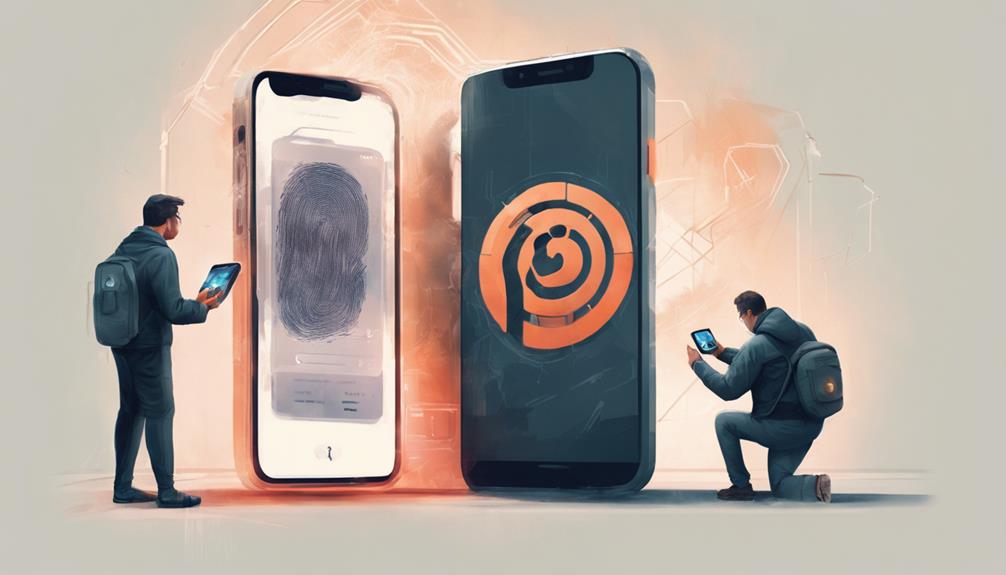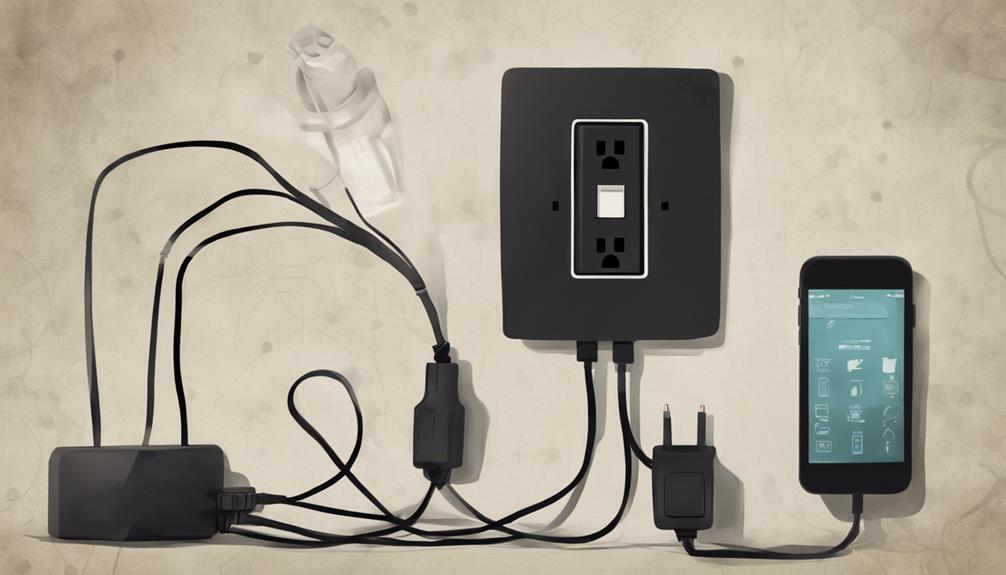To keep your phone safe from hackers, implement security measures such as strong lock screen passwords, regular software updates, and trusted app sources. Utilize two-factor authentication and install reputable security apps like Lookout or Norton for added protection. Practice secure password habits, consider a password manager, and remain vigilant for any suspicious activities. By enabling biometric authentication and remote wipe options, you enhance your phone's security. Remember, prevention is key in safeguarding your device from potential cyber threats.
Key Takeaways
- Set up a strong lock screen password and enable biometric authentication.
- Regularly update your phone's software and apps to patch security vulnerabilities.
- Use trusted app sources like official app stores to avoid malware.
- Install reputable security apps for real-time protection against hackers.
- Be vigilant for suspicious activity and potential security breaches on your phone.
Lock Screen Security
To enhance the security of your phone, setting up a robust lock screen password or utilizing biometric authentication is essential in preventing unauthorized access.
Your phone contains a wealth of personal data, making it vital to safeguard against potential breaches. By establishing a strong lock screen code or pattern, you create a barrier that deters unauthorized individuals from accessing sensitive information.
Additionally, incorporating biometric authentication methods such as fingerprint or facial recognition adds an extra layer of security by requiring unique physical identifiers for access.
It is imperative to avoid sharing your lock screen code or biometric data with others to maintain the integrity of your privacy.
In the unfortunate event that your phone is lost or stolen, enabling features like remote wipe or utilizing services like Find My iPhone/Android can help protect your data from falling into the wrong hands.
Regularly updating your lock screen security settings is also advisable to stay ahead of potential security threats and ensure ongoing protection for your device and personal information.
Software Updates

Securing your phone's security extends beyond lock screen measures, with regular software updates playing a critical role in safeguarding against potential vulnerabilities.
- Automatic Updates: Enable automatic software updates on your phone to guarantee timely installation of the latest security patches and enhancements, reducing the risk of exploitation by hackers seeking to access your data.
- App Updates: Regularly update your apps as well, as outdated versions may contain vulnerabilities that hackers could exploit to compromise the security of your phone.
- Proactive Protection: By keeping your phone and apps updated, you proactively protect your device against potential phone hacking threats and security breaches, maintaining a more secure phone environment for your data.
Trusted App Sources

When it comes to ensuring the security of your phone, sticking to official app stores such as Google Play Store or Apple App Store is essential. These platforms have robust security measures in place to scan and verify apps for any potential threats before they are available for download.
In contrast, sideloading apps from third-party stores or websites can expose your device to counterfeit or infected software, putting your phone's security and privacy at risk.
App Store Security
Choosing apps solely from official app stores like Google Play Store for Android or Apple App Store for iOS is crucial for upholding the security of your phone and safeguarding it from potential threats. When opting for trusted app sources, users benefit from the following:
- Enhanced Security Measures: Official app stores conduct rigorous security checks to identify and eliminate malicious software, reducing the likelihood of inadvertently downloading harmful apps.
- Protection Against Compromised Apps: By utilizing reputable app stores, individuals can mitigate the risk of downloading compromised apps that may pose a threat to their device's security and privacy.
- Authenticity and Reliability: Sticking to trusted app sources ensures that the apps you download are genuine, regularly updated, and devoid of malware or other security risks. This practice promotes a safer and more secure environment for users to explore and download applications.
Sideloading Risks
To safeguard your phone from potential security threats, it is essential to understand the risks associated with sideloading apps from untrusted sources. Sideloading apps from untrusted sources increases the likelihood of malware or spyware infecting your device, exposing it to security vulnerabilities.
Unlike trusted app stores such as Google Play or Apple App Store, which have strict security measures to verify app safety, sideloading bypasses these checks, making your device susceptible to malicious apps. These malicious apps from untrusted sources can compromise your personal data, track your activities, or even gain control over your device, leading to hacking and data breaches.
To maintain the security of your phone, it is vital to only download apps from official app stores, reducing the risk of falling victim to potential security threats associated with sideloading.
Two-Factor Authentication

Two-factor authentication is an essential security measure that requires users to provide two forms of verification to access their accounts. This can include methods like receiving a code via SMS, using an authenticator app, or biometric verification.
Secure Login Methods
Implementing an additional layer of security beyond just a password is essential to safeguarding your accounts from unauthorized access. Two-factor authentication, a method that requires a second verification step, offers a robust defense against potential hackers.
Here are three common methods to enhance security:
- Text Message Codes: This method involves receiving a unique code via text message, which serves as the second verification step after entering your password.
- Security Keys: Using a physical security key adds an extra layer of protection by requiring the physical presence of the key to access your account, making it difficult for hackers to breach.
- Biometric Methods: Biometric authentication, such as fingerprint or facial recognition, offers a secure and convenient way to verify your identity, further strengthening the security of your accounts.
Authentication Code Verification
Enhancing account security through authentication code verification is essential in safeguarding sensitive information from unauthorized access. Two-factor authentication, which involves requiring a code in addition to your password, provides an additional layer of security to prevent unauthorized access, even if your password is compromised. This method is commonly implemented through SMS, email, or authenticator apps like Google Authenticator.
Below is a table showcasing some key points related to authentication code verification:
| Key Points | Description | Examples |
|---|---|---|
| Method of Verification | Two-factor authentication adds an additional layer of security through code verification. | SMS, Google Authenticator |
| Prevents Unauthorized Access | This process helps prevent unauthorized access to your accounts, even if your password is compromised. | Major online services |
| Widely Used | Two-factor authentication is widely employed by major online services, banks, and social media platforms. | Google, Facebook |
Implementing two-factor authentication significantly decreases the risk of unauthorized access to your accounts, making it an important step in securing your sensitive information.
App-Specific Passcodes
To further fortify account security beyond traditional password measures, adopting app-specific passcodes for two-factor authentication is a prudent approach. This method adds an extra layer of security by requiring a unique passcode in addition to your regular password.
Apps such as those for banking or email can be configured to prompt for a specific code sent to your phone for access, ensuring that even if your password is compromised, unauthorized access is prevented. App-specific passcodes play an essential role in safeguarding sensitive information and thwarting potential breaches.
Security Apps Installation

Consider installing reputable security apps on your phone to bolster its defenses against malware and cyber threats. Apps like Lookout, Avast, or Norton provide real-time protection against malware and phishing attempts. These security apps offer a range of features including antivirus scans, safe browsing tools, and anti-theft capabilities to safeguard your device.
Additionally, some security apps go a step further by offering VPN services to encrypt your internet connection, enhancing the security of your data from potential hackers.
To ensure top-notch protection, it is important to choose security apps with high ratings and positive reviews, indicating their reliability in safeguarding your device. Regularly updating your security app is essential as it allows you to stay protected against the latest threats and vulnerabilities, ensuring that your phone remains secure against evolving cyber risks.
Strong Password Practices

To fortify the security measures on your phone, implementing strong password practices is pivotal in safeguarding your personal information and accounts from potential breaches. When creating passwords, consider the following key practices:
- Use Complex Passwords: Incorporate a combination of letters, numbers, and special characters to enhance the strength of your passwords and deter hackers from gaining unauthorized access.
- Utilize a Password Manager: Consider using a reputable password manager to generate and securely store complex passwords for different accounts, reducing the risk of password-related breaches.
- Regularly Change Passwords: It is essential to change passwords regularly to mitigate the chances of unauthorized access to your accounts. By frequently updating your passwords, you add an extra layer of security to your online presence.
Additionally, enabling two-factor authentication provides an added level of protection beyond just passwords, ensuring that even if passwords are compromised, unauthorized access is prevented.
Vigilance for Suspicious Activity

Maintaining awareness of potential signs of suspicious activity on your phone is essential for detecting and mitigating potential security breaches. Signs that your phone may be compromised include sudden battery drain or unexplained data usage, which could indicate that someone is trying to hack into your device.
Additionally, receiving strange calls, texts, or notifications that you didn't initiate may signal unauthorized access to your phone. Background noises during calls or delays in shutting down your device could be indicators of someone tapping into your phone, potentially compromising your personal information.
Random pop-up messages or unexpected notifications are also red flags that hackers may be attempting to breach your phone's security. By staying vigilant and monitoring your phone for these unusual behaviors, you can take proactive steps to prevent data breaches and protect your device from hacking methods.
Regularly reviewing your phone's settings and permissions is essential to ensuring that no unauthorized access points are jeopardizing your phone's security.
Frequently Asked Questions
Can I Prevent My Phone From Being Hacked?
To prevent phone hacking, implement robust security measures like complex passcodes and two-factor authentication, avoid unofficial app sources, update regularly, use reputable security apps, and monitor for unusual activity. Proactive measures are essential.
Can You Remove a Hacker From Your Phone?
Like extracting a thorn from a wound, expelling a hacker from your phone requires swift action. Disconnect from the internet, change passwords, and consider a factory reset. Seek professional assistance to guarantee complete removal.
Can You Check to See if Your Phone Is Hacked?
To check if your phone is hacked, look for signs like rapid battery drain, unfamiliar apps, strange calls or texts, unusual background noises, and random pop-up messages. Utilize security apps for scanning and consider consulting a cybersecurity professional for a thorough assessment.
Can Hackers See You Through Your Phone?
In a digital landscape fraught with vulnerabilities, the notion of hackers potentially infiltrating your phone's camera may evoke concern. While stringent security measures can mitigate such risks, vigilance and proactive safeguarding remain imperative in thwarting intrusive cyber threats.
Conclusion
To sum up, safeguarding your phone from hackers requires a multi-faceted approach that includes:
- Securing your lock screen
- Staying updated on software
- Using trusted app sources
- Enabling two-factor authentication
- Installing security apps
- Practicing strong password habits
- Remaining vigilant for any suspicious activity
By implementing these measures, you can protect your personal information and guarantee the security of your device.
Stay informed and proactive to keep your phone safe from potential threats.









